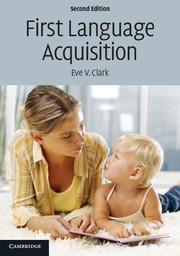Part IV - Process in acquisition
Summary
[E]very child processes the speech to which he is exposed so as to induce from it a latent structure. This latent structure is so general that a child can spin out its implications all his life long. It is both semantic and syntactic. The discovery of latent structure is the greatest of the processes involved in language acquisition, and the most difficult to understand.
Roger Brown & Ursula Bellugi 1964Chapter 15: Specialization for language ▪ 357
Chapter 16: Acquisition and change ▪ 378
The next two chapters take another look at the nature/nurture debate for language acquisition and consider some of the biological evidence for specialization for language. The first takes up what happens to language acquisition after brain damage and in certain special populations where acquisition cannot follow a normal course, as well as what happens when the normal social settings are not available to children. The second chapter focusses on general processing capacities, the role these play in acquisition, and the kinds of mechanisms that might account for some common patterns observable in the acquisition of different languages. It also considers the multiple representations needed for language and the general learning mechanisms children might rely on as they change their language into something closer to the language of their speech community.
- Type
- Chapter
- Information
- First Language Acquisition , pp. 355 - 356Publisher: Cambridge University PressPrint publication year: 2009



